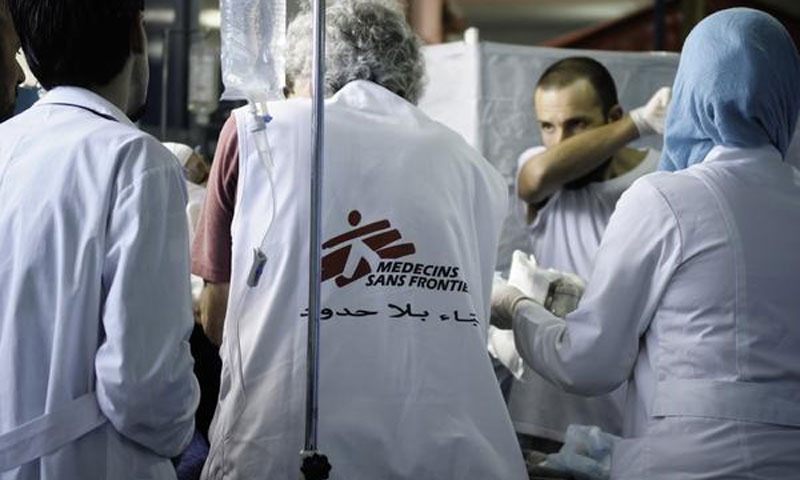
The Syrian Civil Community at a Crossroads.. Humanitarian Organizations Patiently Wait for “2165”

Millions of Syrians anxiously await the fate of the United Nations’ Resolution 2165 relating to humanitarian aid delivery to Syrian areas, especially those witnessing an armed conflict, without the Syrian regime’s consent.
The members of the Security Council will vote on the Resolution early next year. However, fear takes over the scene for Russia might not pass the Resolution using “veto” against it to indulge Syrian people in another journey of restrictions and suffering.
The different forms of aid (Humanitarian, medical and health-related) offered by organizations to Syrian civilians helped ease the pain of the siege policy, which the Syrian regime has been imposing on a number of areas to force the opposition to surrender.
Cross-Border Aid
In July 2014, the Security Council issued the resolution which stated that the United Nations’ agencies and humanitarian partners have the permission to use the border crossings at Bab al-Salam, Bab al-Hawa, Al Yarubiyah (Iraq) and Al-Ramtha (Jordan), in addition to those already in use. The permission was given to “ensure that aid, including medical and surgical supplies, would reach the people in need in the different parts of Syria through the shortest routes.”
In addition to this, the Resolution stated that “all the Syrian parties involved in the conflict should allow for a direct delivery of assistance to people throughout Syria in an immediate manner and without obstacles.”
The United Nations’ Resolution has been renewed more than once, most recently in January 2017, and ends on January 10 next year, according to Ibrahim Ulabi, the director of the Syrian Legal Development Programme, who pointed out that there are fears of not renewing it because the Syrian regime is trying hard to limit aid delivery.
Ulabi explained that UN Resolution, called “cross-border”, means allowing UN organizations and their humanitarian partners to operate across borders without the regime’s approval, bypassing the principle of international sovereignty. That principle does not allow UN organizations to cross any country without the consent of the host country. However, the Syrian situation allowed access to Syrian regions without the approval of the regime, and UN has established a special fund to sponsor the organizations operating across borders.
In its turn, the Syrian regime seeks not to renew the Resolution depending on its Russian ally, which would use “veto” to do so, and is pushing hard to reach the “Cross the line” resolution which is the provision of humanitarian aid through the lines of contact and war.
Demanding such a resolution, the Syrian regime tries to restore its legitimacy in front of the international community by changing the manner through which aid is introduced to all the Syrian regions, the opposition-held Idlib for example. In this case, aid must pass through the regime’s channels, such as the Red Crescent.
International Organizations Suspend Aid to Daraa
Fears of not renewing the Resolution in the corridors of the Security Council led some international organizations, which have been active in different areas in Syria, to minimize aid and notify the collaborators that they will stop working early next year.
In Daraa, most of the international organizations began to reduce the number of contracts which they have been annually signing with local councils, employees, distributors, trucks, and warehouses.
They also made the decision not to renew a number of these contracts permanently, according to Shadi al-Masalha, the field official, who was formerly responsible for distributing aid in Quneitra. He confirmed to Enab Baladi that these procedures were accompanied by huge aid cuts and many organizations’ suspension of their work.
Sheikh Faisal Abazid, a member of Draa Governorate Council, confirmed to Enab Baladi that the International Relief and Development Organization (IRD), one of the largest aid organizations in the southern region over the past years, has announced the suspension of its work. However, many organizations did not make such an announcement.
Al-Masalha said that the news of the cessation of support is predicting catastrophic results due to the heavy dependence on the aid provided by these organizations. The cut threatens a large number of the displaced people and the area’s residents, and it increases the number of poor people and the consequences of poverty, which lead to the prevalence of theft and other similar phenomena.
International Organizations Withdraw from Ghouta
Organizations in Eastern Ghouta were not better than those in Daraa. A number of organizations have begun to withdraw, according to Dr. Rami Abu al-Wafa, the medical director of Al-Amin for Humanitarian Support, who assured to Enab Baladi that, about four months ago, a number of organizations stopped supporting medical centers in Ghouta and fund has been cut to ambulatory medical points, hospitals and health centers.
Médecins Sans Frontières (MSF), one of the first organizations to have worked in Ghouta and had a positive role in raising the level of work, stopped 16 centers and there is information about suspending other centers.
Abu al-Wafa explained that the medical institutions and the rest of the centers have been informed of the suspension of support by the end of this year, which means stopping the services in the absence of another supporter.
He pointed out that there are international organizations that are still operating in Ghouta and carrying out a number of projects. However, they are waiting for the decision of the Security Council concerning the Resolution, such as UN OCHA, which stated that if the resolution was stopped, support would be suspended.
Majd al-Dimashqi, al-Amin’s director, from inside Eastern Ghouta, told Enab Baladi that, three months ago, MSF stopped supporting 14 medical centers and, a short time ago, it informed ten other centers that it would stop supporting them early next year.
On the stated reasons for stopping the support, al-Dimashqi pointed to the organizations’ tendency to finance central projects instead of small ones because they are more useful, as confirmed by MSF’s coordinator in Eastern Ghouta, Dr. Hammam Abu Essam.
However, al-Dimashqi considered this as inaccurate, especially with the continuous shelling under which the cities and the towns of the region are striving. The shelling is targeting medical centers, hospitals particularly, a thing that highlights the importance of having multiple hospitals distributed over the area.
MSF’s coordinator confirmed the suspension of support for Al-Fayhaa Medical Center in the city of Saqba, which is the largest healthcare center in Ghouta. It treats about 10,000 patients monthly and offers 1200 permanent prescription and 10,000 prescriptions in general. In addition to this, a number of medical centers have been suspended, which led to catastrophic effects in the absence of a new sponsor.
As for the reasons which led the organization to stop its support, the coordinator refused to make a statement. “I am not authorized to make a statement about the reasons for stopping support,” he said.
Zaidoun al-Zu’bi, the director of “UOSSM,” pointed to complex situation of Ghouta in terms of large money orders, which sometimes reached 17 percent and led to the involved organizations’ aversion.
Turkey Scrutinizes Organizations’ Activities and Support
In northern Syria, organizations at the borders with Turkey are also waiting for the United Nations Resolution. Abu al-Wafa pointed out that many organizations have applied for projects with the World Food Program (WFP), including al-Amin.
In the beginning, the projects were approved, however, the organization frankly announced that it will suspend its intervention in northern Syria if the Security Council decides to stop the “cross-border” resolution.
Al-Zu’bi said that some organizations have moved from the north to the south because of the Turkish government’s policy, such as the “International Rescue Committee,” in addition to the decline in the intervention of others, including “International Medical Corps,” which are among the top aid organizations.
These organizations’ intervention in Syria has become limited.
He added that the Turkish government was one of the strongest entities supporting organizations, and it used to overlook their work. Lately, it started to scrutinize and put many restrictions on money orders.
In addition to that, the Turkish government started to ask for a work permit for all the members working in organizations, especially in the city of Gaziantep at the Syrian-Turkish borders, which is rich with humanitarian organizations. This increased the suffering of many Syrian working people there.
He pointed out that Turkey aims to regulate the activities of these organizations on its land.
Four Factors behind Support Cuts
Talks about support cuts and the reasons behind them have become the main subject of discussion for Syrian people in general and organizations in particular.
Al-Zu’bi pointed out that the issue is not the cuts in themselves, but rather, it is the political complexities accompanying the happenings in Syria. He said that UNICEF is the only organization that reduced its support.
However, the Humanitarian Support Fund has only reduced the duration of its support to nine months. These steps mean that the involved organizations did not cut support, but they are being anxious to make sure that the resolution “2165” will be renewed. The resolution will be certainly extended for six months at least, according to Al-Zu’bi.
As for the reasons behind the withdrawal and reduction of support, al-Zu’bi stressed that there are several factors.
The first factor is the reduction of the geographical area where the Syrian civil society organizations existed and functioned. The area used to include large parts of Aleppo, Hama, Idlib and Damascus’ countryside. However, these areas have been reduced while the Syrian regime progressed.
The second factor is related to “Hay’at Tahrir al-Sham’s,” accused of affiliation to “Al-Qaeda,” control over Idlib governorate in northern Syria, the thing which complicated the methods and the possibilities of intervention in the area.
The third factor relates to the changes in the political scene and its complicated nature in the north and northeast of Syria, and the Turkish policy which affected the presence of some organizations in Gaziantep.
The fourth factor relates to the “cross-border” issue and the fear that the Security Council might not pass the resolution 2165.
Al-Zu’bi stressed that these factors have affected the volume of support. Some organizations have delayed support and others have stopped it, in addition to changing the location of organizations and transferring some of them from the north to the south for purely political reasons unrelated to the humanitarian need.
Funding in the south has been concentrated and increased, contrary to what is rumored to be shrinking, pointing out that, so far, the north has not been severely affected, but there are signs of aid going down.
Analysis about Restoring Assad’s Legitimacy
In addition to the above-mentioned reasons, Rami Abu al-Wafa, the medical director of Al-Amin for Humanitarian Support, considered that the aid cuts are related to politics, citing that MSF does not officially work according to the “cross-border” resolution for it functions from Lebanon which is not included in the resolution. Accordingly, the United Nation Resolution 2165 has nothing to do with the organization’s aid cuts, considering that the cuts are the result of a political decision.
Abu Al-Wafa predicted that the withdrawal of the organizations would provide an opportunity for the organizations of the Syrian regime’s government to intervene. It would also pave the way for the regime to monopoly aid distribution, which means legitimizing and polishing its image through presenting the world an illusion that the regime has restored services to all Syrian areas and with its own supervision.
Shadi al-Masalha, the field official, who was formerly responsible for distributing aid in Quneitra, said that there are talks about some organizations attempts to open offices in the areas under the regime’s control and then return to work in the liberated areas. In another word, the relief file will be coordinated with the regime, and it will have control over the whole issue, pointing that there is a regional urge to officially work with the regime and to push the relief file into the forefront.
He pointed out that in case that the relief file reaches the hands of the Syrian regime becoming under its control, the regime will utilize the field for its own sake, to spy on the liberated areas or to pressure them and not give them the amounts owed.
Zaidoun al-Zu’bi considered the pressure on organizations, which implies that their action should be limited to the regions of the regime, is just a matter of speculation and analysis. There is no clear information so far; the entire indicators hint at the restrictions imposed on the organizations in Turkey only. There was no openness to the regime, and the organizations have not been registered in the areas of the regime; “I am almost certain that it will not happen at least in the foreseeable future,” he said.
Effects and Expectations
The failure to renew the UN Resolution and the organizations’ cuts of aid have certain effects which have been described by some as catastrophic. Abu al-Wafa said that civilians cannot find food inside Ghouta, and they are unable to pay the price of medicine, which the organizations are currently providing, considering that, “the situation is unfortunate.”
Majd al-Dimashqi stressed that aid cuts to a large number of medical centers in Ghouta will have negative effects on the size and quality of the medical services provided to the besieged people. In addition to this, the cuts will be the reason to cancel hundreds of jobs, which threatens to trigger social repercussions, especially that unemployment rates are becoming frantic.
Al-Zu’bi expressed his concerns for the future, “saying that there are serious concerns. We are not sure if the Security Council is going to renew the Resolution or not. We are also not sure until when the Turkish government will continue with its work permits policy which is currently applied hampering the work of the organizations in the north. We do not know if Hay’at Tahrir al-Sham will be taking any futuristic steps or not.”
He considered that these concerns are affecting the methods of the organizations’ work and expressed fear saying that “the future is not bright for the Syrian civil society as a whole. It is at a crossroads because it did not form an entity to represent it and to negotiate on its part. Accordingly, it could not respond effectively to the happenings.”
In the opposition-held areas, Syrian people are waiting for another siege, an international one, if the Security Council refuses to renew the Resolution especially that 13 million civilians in Syria are in need of help. 6.3 million of these people, according to Mark Lowcock, the United Nations Under-Secretary-General for Humanitarian Affairs and Emergency Relief Coordinator, have urgent needs due to displacement and fighting.
A Syrian Legislator: Cards in the Hands of Local Organizations
Enab Baladi made an interview with Ibrahim Ulabi, the director of the Syrian Legal Development Program, who is informed of UN resolutions, said that the “cross-border” resolution is related to UN and its partner organizations, accordingly, the failure to renew the Resolution means stopping the work of UN organizations.
However, there is a possibility for the organizations, which are directly supported by countries, to continue working. He pointed out that there are different point of views about the issue; there are certain countries which insist on the need to ask for the involved country’s permission and are considered legally strong while there are countries that do not comply with permission to provide support.
Ulabi explained that many organizations were working before UN adopted the Resolution in 2014. The Security Council allowed and did not scrutinize aid, but there is a current concern about the failure to renew the Resolution, which means that the Security Council will stop all forms of support.
About the effects of the failure to renew the Resolution, Ulabi assured that this would affect the organizations, which could not handle the failure, catastrophically.
He explained that organizations, whether the Resolution has been renewed or not, must demand to continue working by getting a direct support from international organizations and countries. There are many organizations and countries which approve to fund organizations in a cross-border manner without a Security Council resolution for funding is not done by the United Nations only, and there are organizations which have a Saudi, Qatari and American funding […].
He explained that it is impossible to make a generalization of the organizations’ aid cuts because there are many of them and the fund that is being pumped into Syria has different sources. Accordingly, we should search for the organizations which have minimized their support and the reasons why they took such steps. There are organizations which change their priorities and corresponding strategies. For example, they might lean towards supporting Syrian refugees in the neighboring countries instead of the people who are still inside the country. Others may focus on the issue of reconstruction; there are also other organizations who stopped their work and ones which changed the areas they wish to support.
He called for the Syrian organizations to plan for the future of their work and to develop a strategy for implementation. If the Resolution is not passed, they will have the following options: Either to deal with Damascus, and here a decision must be made, whether to continue working or to stop and whether they accept the demand for licenses from the Syrian regime, which can be considered a blow to the Syrian regime because these organizations are considered as affiliated to opposition and that they are working in Damascus due to the Russian pressure only or talking with Russia as humanitarian organizations to secure a place in the area. They can also go for helping refugees in Turkey, Lebanon, Iraq or Burma, similar to what some organizations have done, or totally shut down.
About the news that the organizations are going to the areas of the regime, he said that “we do not need analysis; we need facts”. However, he considered that if the relief organizations were to register in Damascus, under the Syrian regime, and it allowed them to reach opposition-held areas, such as Idlib, this would only mean restoring legitimacy to the regime. Here, the organizations, who are providing services to millions of people in need, are not to blame but the military troops and factions.
Concerning solutions, Ulabi stressed that pressure, first, should be placed on the humanitarian option, so if the decision becomes the regime’s and it did not deliver aid, it must be scandalized by issuing accurate reports, which are not based on emotions but proofs. In addition to this, organizations must take the decision to continue working and to be partners for organizations functioning in Damascus.
if you think the article contain wrong information or you have additional details Send Correction
النسخة العربية من المقال
-
Follow us :
Most viewed
- Al-Sharaa and Abdi reach agreement on merger of SDF into Syrian state
- Syrian Defense Ministry appoints "Abu Amsha" as Hama Brigade commander
- No financial flows to Syria despite partial lifting of sanctions
- Turkey confirms continuation of its operations in northeastern Syria
- Governor of As-Suwayda signs understanding agreement with al-Hijri: Key details unveiled

















 A
A
A
A
A
A


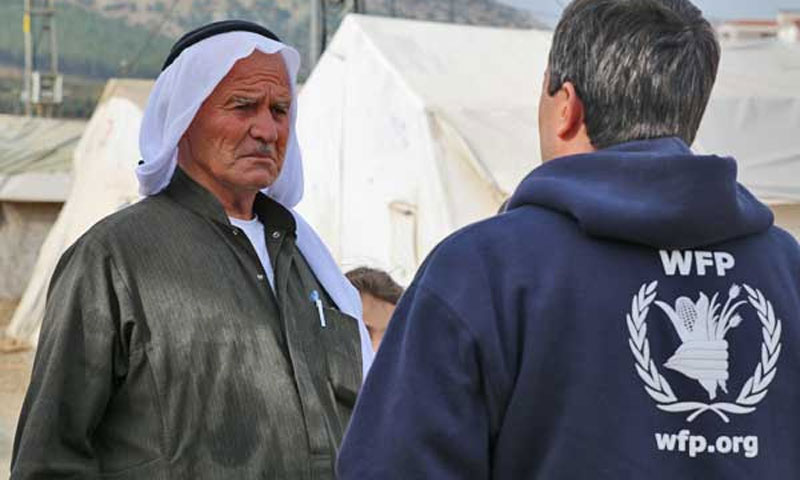


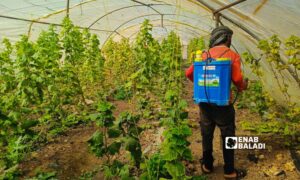
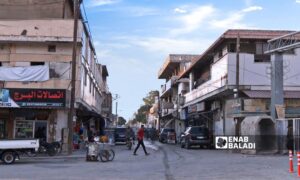
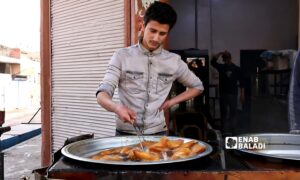
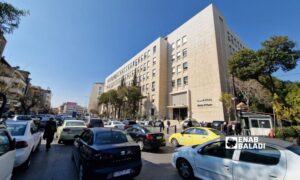
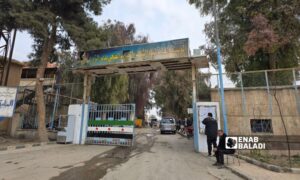
 More Economy
More Economy